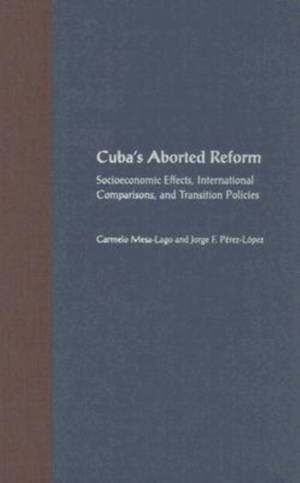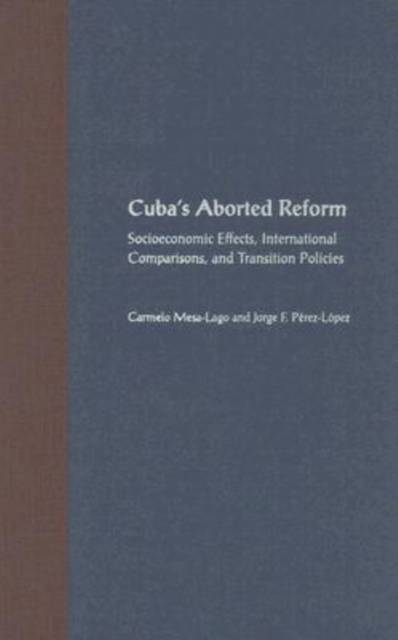
- Retrait gratuit dans votre magasin Club
- 7.000.000 titres dans notre catalogue
- Payer en toute sécurité
- Toujours un magasin près de chez vous
- Retrait gratuit dans votre magasin Club
- 7.000.0000 titres dans notre catalogue
- Payer en toute sécurité
- Toujours un magasin près de chez vous
Cuba's Aborted Reform
Socioeconomic Effects, International Comparisons, and Transition Policies
Carmelo Mesa-Lago, Jorge F Pérez-López
Livre relié | Anglais
83,95 €
+ 167 points
Format
Description
This volume analyzes Cuban socioeconomic policies and evaluates their performance since the collapse of the Soviet Union and the socialist camp. It provides a brief historical background to the crisis and analyzes in detail the deterioration and incomplete recovery since 1990. Comparing Cuba's performance with that of other Latin American and former socialist countries, it summarizes the views of noted Cuban economists and proposes policies that architects of the Cuban transition might wish to put in place after the passing of Castro.Focusing on economic and social policies and performance during the "Special Period in Time of Peace" (1990-2004), the authors draw on an impressive array of statistics (synthesized in 28 tables) to show that in 2005 Cuba has yet to return to economic levels of the late 1980s, and the access and quality of many of the highly touted social services--education, health care, social security, housing--also have not been restored to the levels achieved prior to the economic crisis triggered by the collapse of the Soviet Union. Meanwhile, they argue, poverty has expanded and unequal access to foreign remittances combined with expanding income differences have exacerbated social inequalities and widened the consumption gap between those with access to hard currency and those without.The authors demonstrate that governmental concerns about a strengthening private sector resulting in loss of political control finally prompted the Cuban leadership to prioritize political over economic ends. It aborted the modest market-oriented reforms of 1993-1996 and actually reversed them in 2003-2004, recentralized the economy, drastically reduced the limited spaces for private economic activity, exerted increasing control over hard currency, prohibited the circulation of the dollar, and stepped up repressive measures on peaceful dissidents. Centralized economic control has been fully restored, even though it will undoubtedly result in further deterioration of economic conditions and declining standards of living.
Spécifications
Parties prenantes
- Auteur(s) :
- Editeur:
Contenu
- Nombre de pages :
- 240
- Langue:
- Anglais
Caractéristiques
- EAN:
- 9780813028682
- Date de parution :
- 30-10-05
- Format:
- Livre relié
- Format numérique:
- Genaaid
- Dimensions :
- 164 mm x 236 mm
- Poids :
- 485 g

Les avis
Nous publions uniquement les avis qui respectent les conditions requises. Consultez nos conditions pour les avis.






